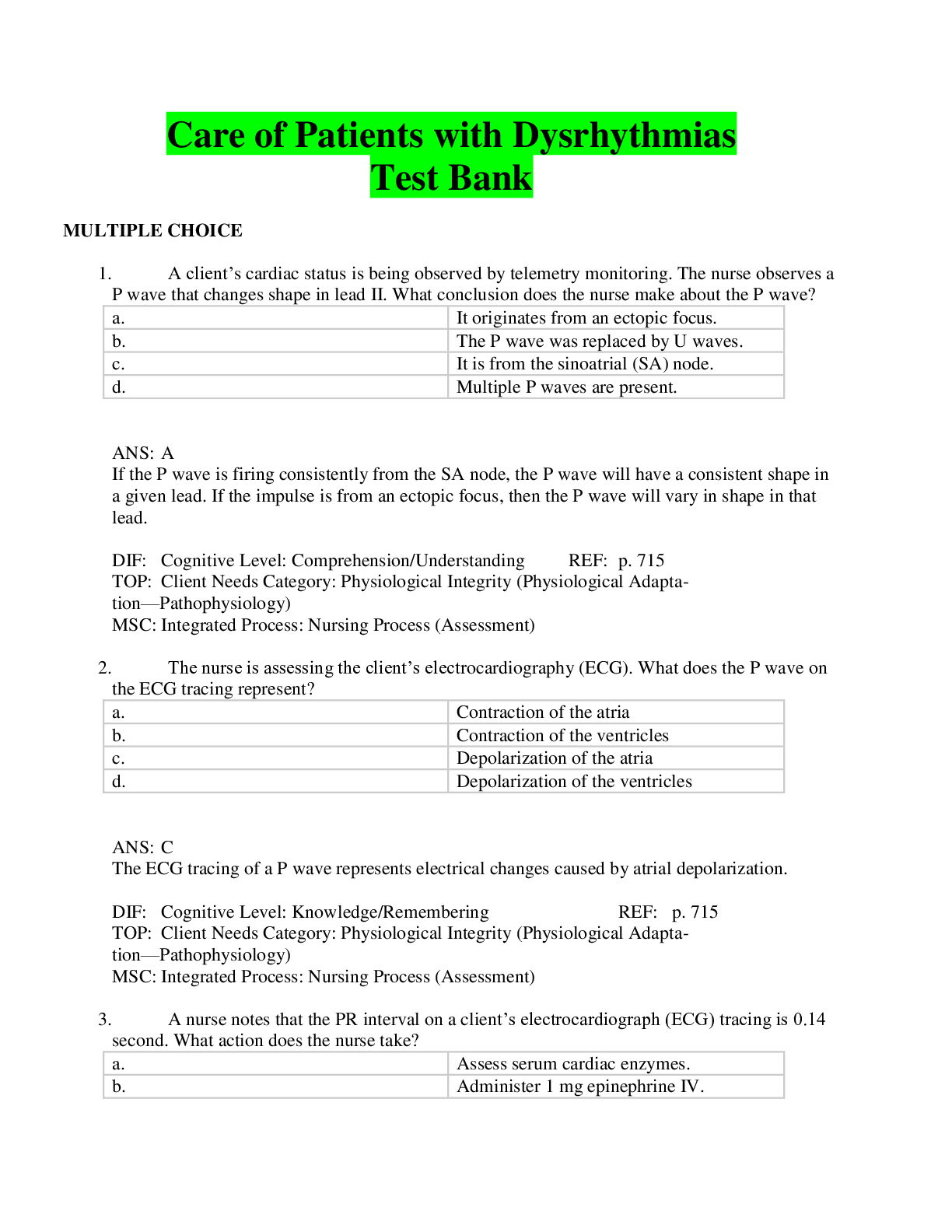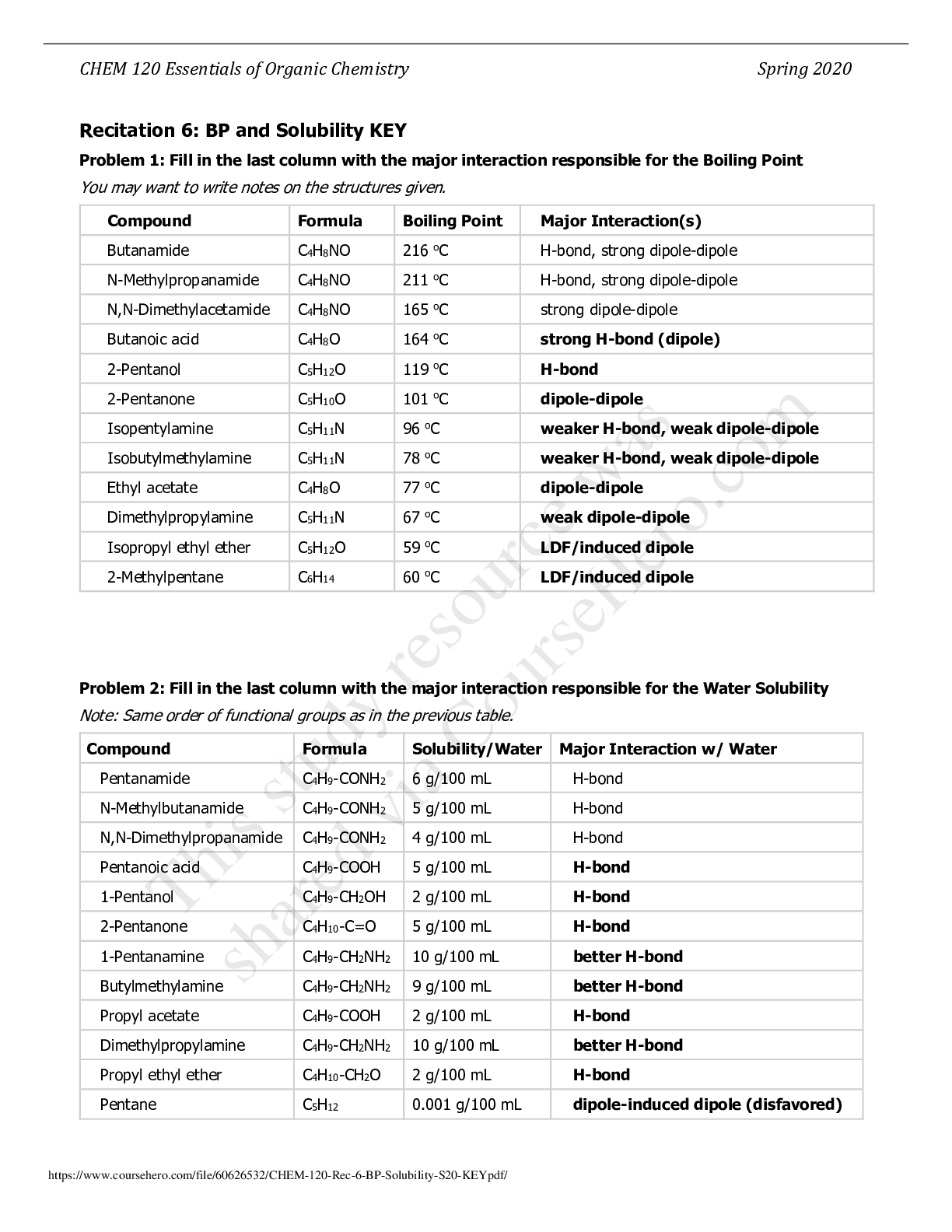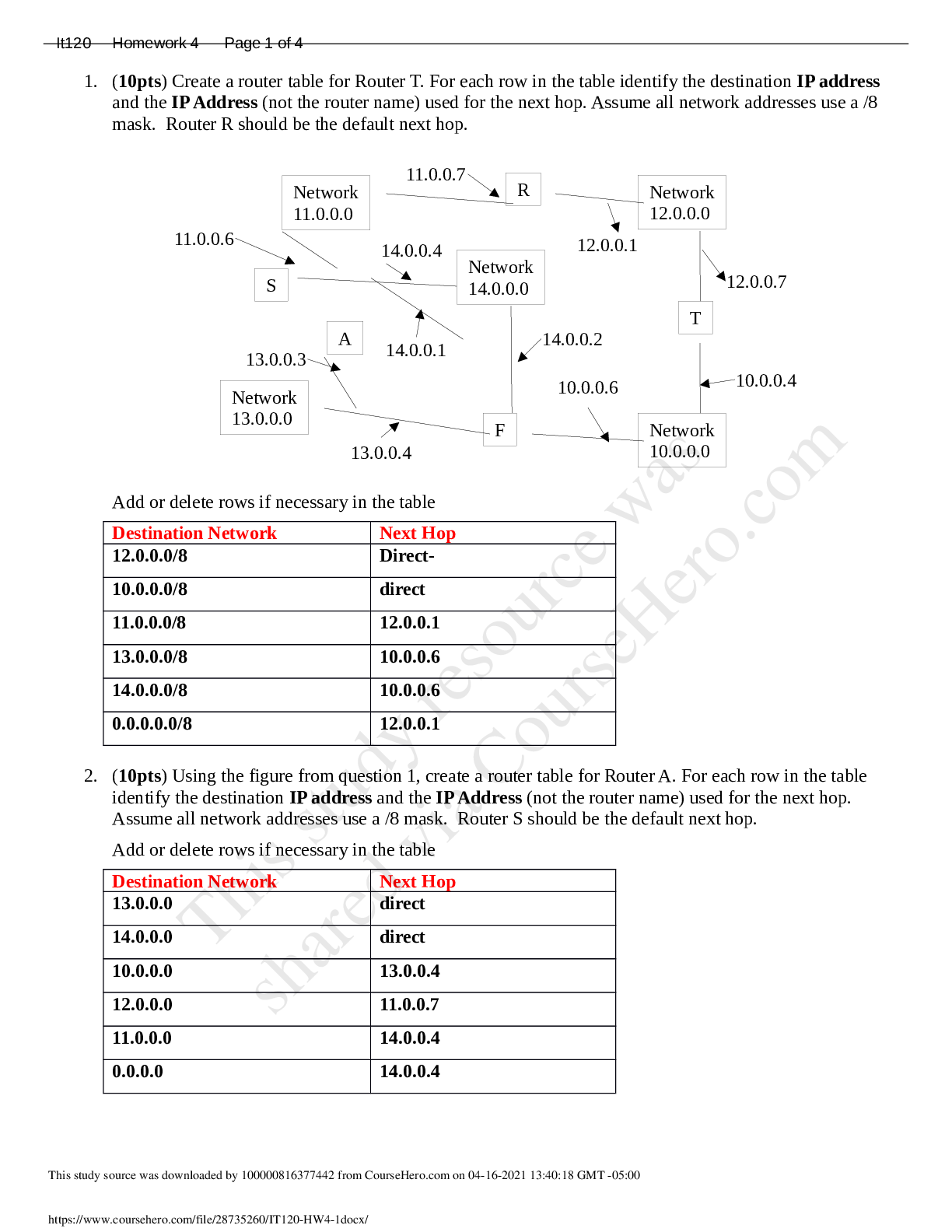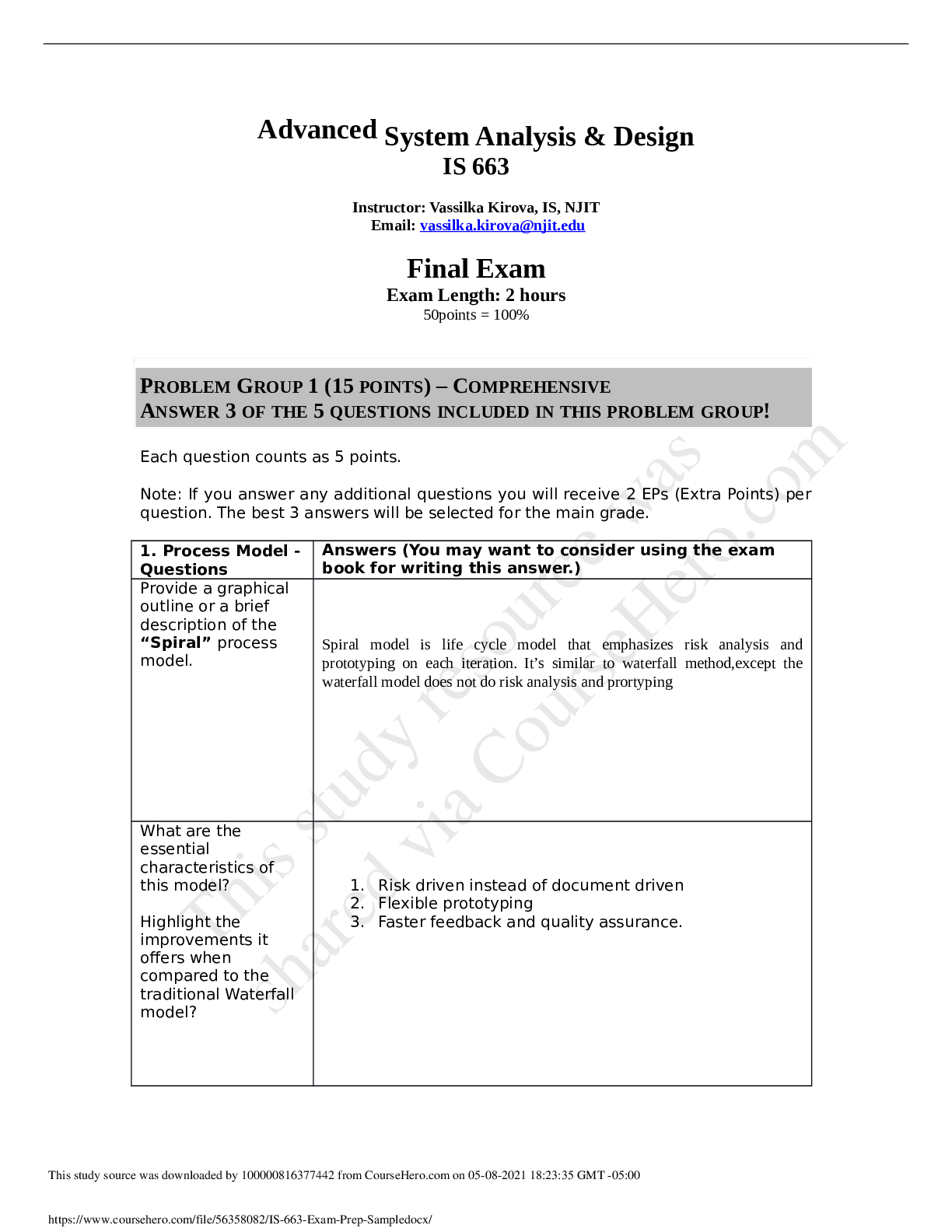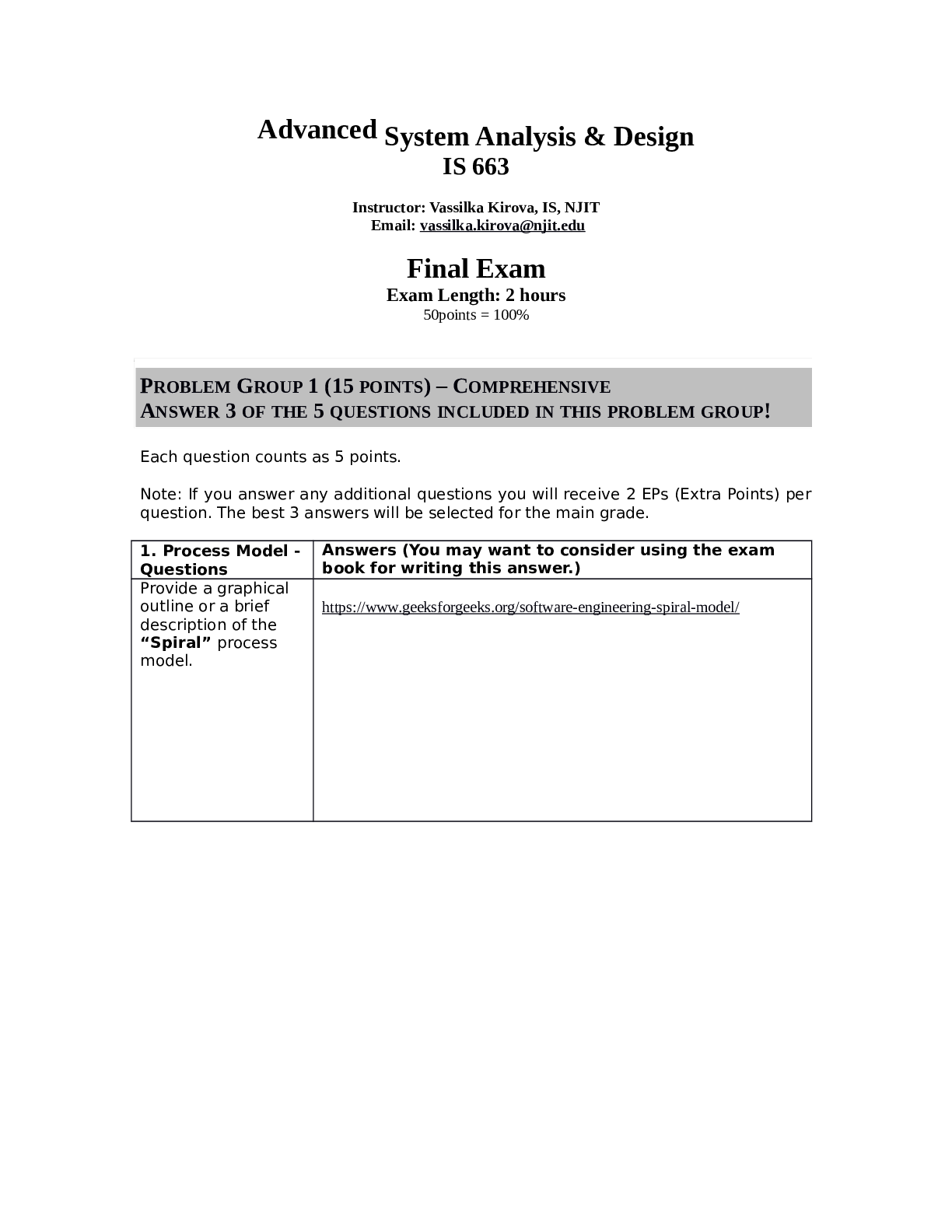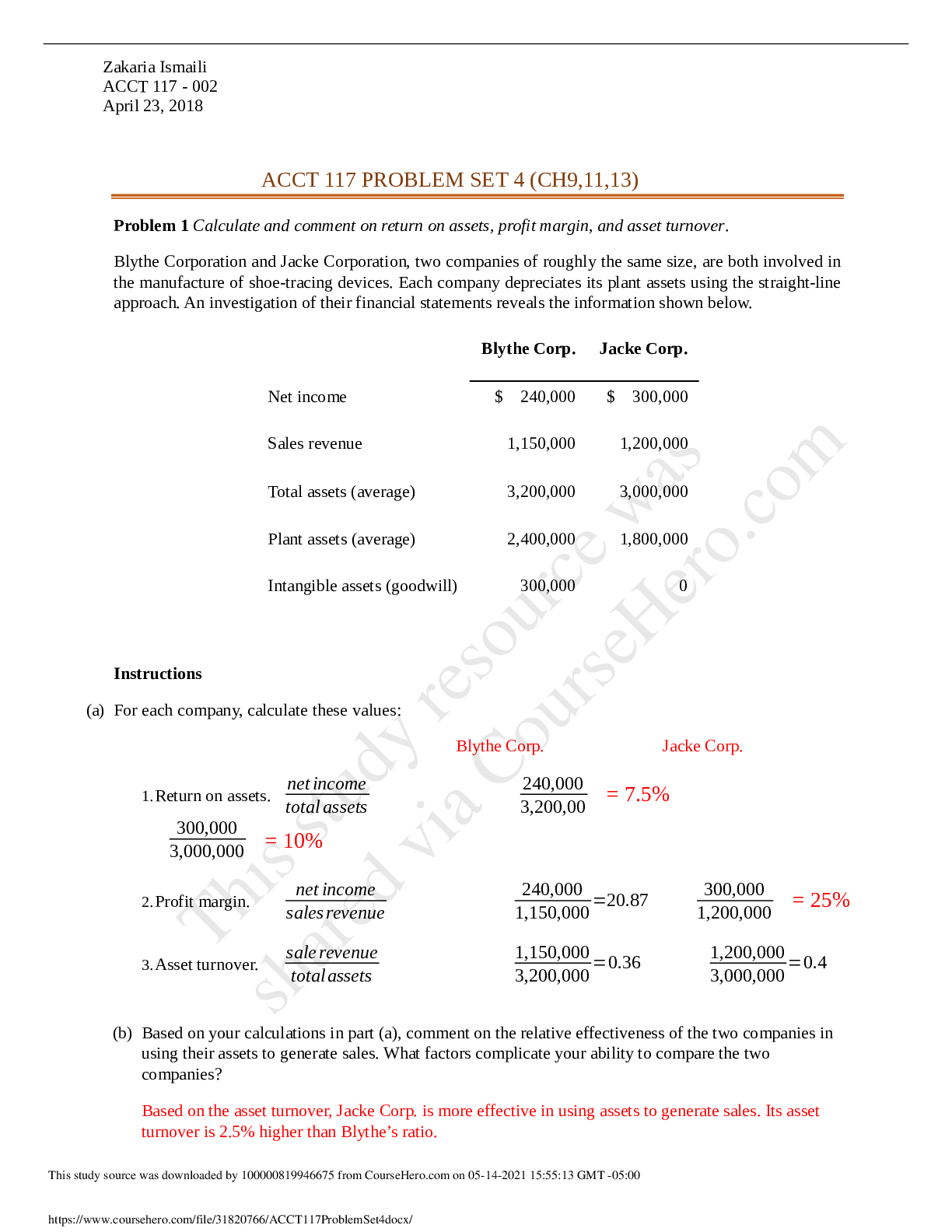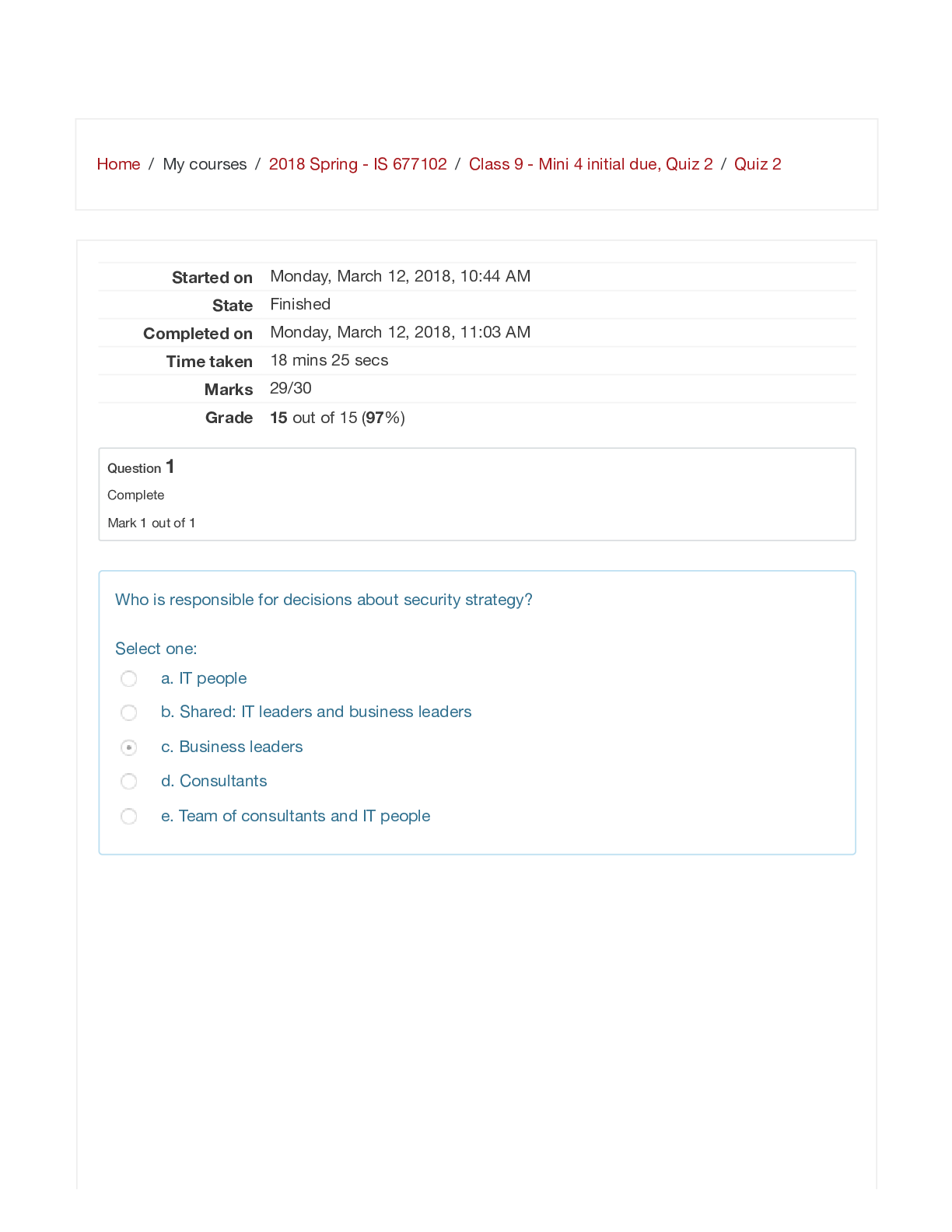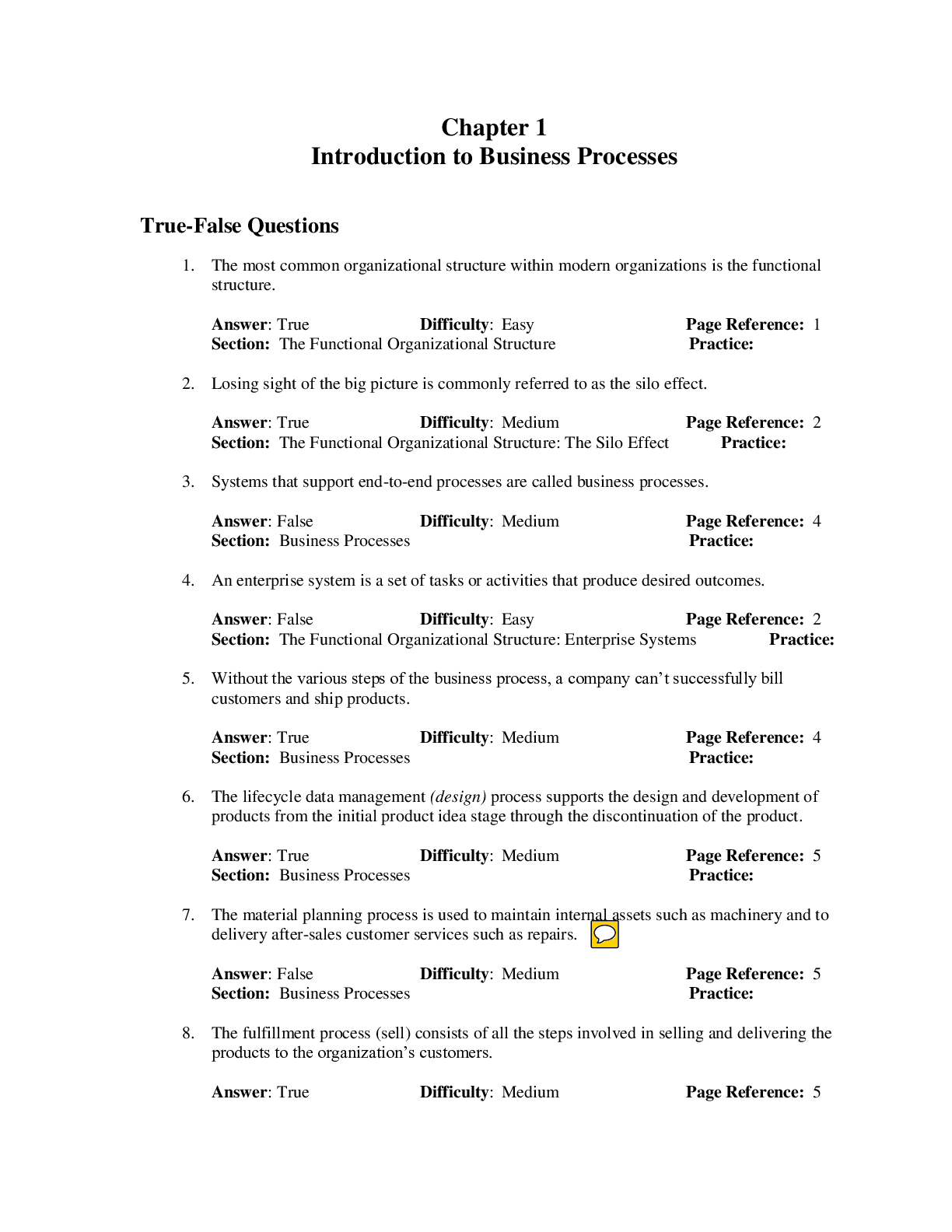Business > QUESTIONS & ANSWERS > ECE 644 : Test Bank for International Business Competing in the Global Marketplace 9th Edition Hill, (All)
ECE 644 : Test Bank for International Business Competing in the Global Marketplace 9th Edition Hill, New Jersey Institute Of Technology.
Document Content and Description Below
ECE 644 Test Bank for International Business Competing in the Global Marketplace 9th Edition Hill Chapter 02 National Differences in Political Economy True / False Questions 1. The two dim... ensions, according to which the political systems can be assessed, collectivism-individualism and democratic-totalitarian are independent of each other. True False 2. It is possible to have a democratic political system that emphasizes a mix of collectivism and individualism. True False 3. When collectivism is emphasized, an individual's right to do something may be restricted on the grounds that it runs counter to "the good of society." True False 4. Plato, to whom the advocacy of collectivism is traced back, did not equate collectivism with equality. True False 5. The central message of collectivism is that individual economic and political freedoms are the ground rules on which a society should be based. True False 6. The communists believed that socialism could be achieved by democratic means, and turned their backs on violent revolution and dictatorship. True False 7. The social democrats believed that socialism could be achieved only through violent revolution and totalitarian dictatorship. True False 8. Modern socialists trace their intellectual roots to Karl Marx (1818-83), although socialist thought clearly predates Marx. True False 9. In an individualist society, the welfare of society is best served by letting people pursue their own economic self-interest. True False 10. Aristotle argued that individual diversity and private ownership are undesirable. True False 11. In practical terms, individualism translates into an advocacy for democratic political systems and market economics. True False 12. Most modern democratic states practice representative democracy. True False 13. In a totalitarian country, there are safeguards to protect an individual's right to freedom of expression, opinion, and organization. True False 14. It is possible to have a totalitarian state that is hostile to collectivism and where some degree of individualism is encouraged. True False 15. In a market economy, if demand for a product exceeds supply, prices will rise, signaling to producers to produce more. True False 16. The number of command economies has fallen dramatically since the demise of communism in the late 1980s. True False 17. The objective of the government in a command economy is to encourage free and fair competition between private producers. True False 18. In a command economy, enterprises have little incentive to control costs and be efficient, because they cannot go out of business. True False 19. In mixed economies, governments also tend to take into state ownership troubled firms whose continued operation is thought to be vital to national interests. True False 20. A nation's legal system is usually of very little interest to international business managers, because international businesses are headquartered in different countries. True False 21. When law courts interpret common law, they do so with regard to tradition, precedent, and custom. True False 22. Judges under a civil law system have more flexibility than those under a common law system. True False 23. Judges in a common law system have the power to interpret the law so that it applies to the unique circumstances of an individual case. True False 24. Common law is primarily a moral rather than a commercial law and is intended to govern all aspects of life. True False 25. A theocratic law system is one in which the law is based on religious teachings. True False 26. The parties to an agreement normally resort to contract law when one party feels the other has violated either the letter or the spirit of an agreement. True False 27. Contracts under a civil law system tend to be very detailed with all contingencies spelled out. True False 28. Many of the world's larger trading nations, including Japan and the United Kingdom, have not ratified the United Nations Convention on Contracts for the International Sale of Goods (CIGS). True False 29. Property rights refer to the legal rights over the use to which a resource is put and over the use made of any income that may be derived from that resource. True False 30. To facilitate international business, property rights are defined in a consistent way across countries. True False 31. Property rights can be violated in two ways—through private action and through public action. True False 32. The Foreign Corrupt Practices Act does not allow for grease payments. True False 33. In the 1970s, the United States passed the Foreign Corrupt Practices Act which requires all publicly traded companies, whether or not they are involved in international trade, to keep detailed records that would reveal whether a violation of the act has occurred. True False 34. Patents, copyrights, and trademarks establish ownership rights over intellectual property. True False 35. Patents discourage companies from committing themselves to extensive basic research. True False 36. The Trade Related Aspects of Intellectual Property Rights, attempts to reduce intellectual property protections to enhance trade. True False 37. Product liability sets certain safety standards to which a product must adhere. True False 38. Product liability can be much lower if a product does not conform to required safety standards. True False 39. The political systems of a country raise ethical issues that have implications for the practice of international business. True False 40. The political, economic, and legal environments of a country influence the attractiveness of that country as a market or investment site. True False Multiple Choice Questions 41. Interdependent political, economic, and legal systems of a country make up its: A. administrative agenda. B. socioeconomic fabric. C. cultural environment. D. political economy. 42. A political system that prioritizes the needs of the society over individual freedoms is called _____. A. totalitarianism B. collectivism C. capitalism D. egalitarianism 43. Modern socialism has been popularized largely through the work of _____. A. Adam Smith B. Karl Marx C. David Hume D. Thomas Hobbes 44. The ________ believed that socialism could be achieved only through violent revolution and totalitarian dictatorship. A. existentialists B. social democrats C. communists D. anarchists 45. In several Western democracies, the poor performance of state-owned enterprises, because of protection from competition and guaranteed government financial support, led to ________. A. privatization B. nationalization C. liberalization D. socialization of production 46. Which of the following philosophies can be traced back to the ancient Greek philosopher Aristotle? A. Socialism B. Individualism C. Collectivism D. Anarchism 47. The tenet of _____ is that the welfare of society is best served by letting people pursue their own economic self-interest. A. socialism B. communism C. anarchism D. individualism 48. Which of the following statements about individualism is NOT true? A. Individualism promotes private entrepreneurship. B. Individualism promotes free market economics. C. Individualism creates an anti-business environment. D. Individualism advocates for a democratic political system. 49. Which of the following is a feature of a democracy? A. Exercise of absolute control by one person or political party. B. Governance by people or elected representatives. C. Prohibition of entry to opposing political parties. D. Complete restriction of individual political freedom. 50. Totalitarianism: A. refers to a political system in which government is by the people, exercised either directly or through elected representatives. B. is based on a belief that citizens should be directly involved in decision making. C. is a form of government in which one person or political party exercises absolute control over all spheres of human life. D. is based on the idea that the welfare of society is best served by letting people pursue their own economic self-interests. 51. Peoples' right to protest on issues of accountability in public expenditure would be possible in a _____ political set-up. A. dictatorial B. democratic C. totalitarian D. fascist 52. _____ refers to a state where political power is monopolized by a party, group, or individual that governs according to religious principles. A. Representative democracy B. Theocratic totalitarianism C. Tribal anarchism D. Monotheistic communism 53. Which system of government generally permits some individual economic freedom but restricts individual political freedom, frequently on the grounds that it would lead to the rise of communism? A. Tribal totalitarianism B. Right-wing totalitarianism C. Democratic totalitarianism D. Theocratic totalitarianism 54. In a pure market economy: A. all productive activities are owned by the state. B. production is determined by the interaction of supply and demand. C. collectivist goals are given priority over individual goals. D. the prices at which goods are sold is determined by the government. 55. An economy in which the interaction of supply and demand determines the quantity in which goods and services are produced is called a _____. A. planned economy B. command economy C. closed economy D. market economy 56. Antitrust laws in the United States are designed to: A. restrict agricultural subsidies. B. increase trade barriers. C. outlaw monopolies. D. restrict privatization. 57. In a(n) _____ economy the government plans the goods and services that a country produces, the quantity in which they are produced, and the prices at which they are sold. A. market B. command C. open economy D. laissez-faire 58. In a _____ economy, certain sectors of the economy are left to private ownership and free market mechanisms while other sectors have significant state ownership and government planning. A. market B. private C. command D. mixed 59. In which of the following economies would the government be most likely to take into state ownership troubled firms whose continued operation is thought to be vital to national interests? A. Market economies B. Laissez-faire economies C. Liberal economies D. Mixed economies 60. Which of the following statements about the legal systems of countries is NOT true? A. They can affect the attractiveness of a country as an investment site or market. B. They are influenced by the prevailing political system of the country. C. They are almost the same for all countries. D. They are of immense importance to international business. 61. Under the _____, cases are judged with reference to three characteristics: tradition, precedent, and custom. A. theocratic law system B. civil law system C. contract law system D. common law system 62. A civil law system tends to be less adversarial than a common law system, since _____. A. the judges' decisions are based on detailed legal codes B. the judges have the freedom to interpret laws based on the situation C. the judges' decisions are based on religious teachings D. the judges are guided by interpretations made in prior legal cases 63. A common law system is different from a civil law system because: A. a common law system is based on religious teachings, while a civil law system is based on cultural traditions. B. a common law system is very rigid, while a civil law system tends to be more flexible. C. in a common law system a judge relies on legal codes to make rulings, while in a civil law system a judge relies on his intuition and moral reasoning to make judgments. D. in a common law system a judge has the power to interpret the law, while in a civil law system a judge has the power only to apply the law. 64. A _____ system is based on a very detailed set of laws organized into codes. A. traditional law B. theocratic law C. civil law D. common law 65. A theocratic law system is one in which the law is based on: A. religious teachings. B. tradition, precedent, and custom. C. a detailed set of laws organized into codes. D. cultural and social norms. 66. _____ is the collective term for the legal rights relating to the use to which a resource is put and over the use made of any income that may be derived from that resource. A. Trade rights B. Property rights C. Positive rights D. Common rights 67. In Russia in the chaotic period following the collapse of communism, an outdated legal system, coupled with a weak police force and judicial system, allowed the Russian Mafia to demand "protection money" from business owners. Any business owner who rebelled had to face violent retribution. This violation of property rights exemplifies _____. A. private action B. copyright violation C. infrastructural failure D. public liability 68. Violation of property rights done through legal mechanisms such as levying excessive taxation and requiring expensive licenses or permits from property holders is called ________. A. private action B. collective action C. public action D. copyright violation 69. Which of the following areas of international trade is regulated by the Foreign Corrupt Practices Act? A. Making and performance of commercial contracts in international trade. B. Preventing bribery and unethical acts in the conduct of international business. C. Establishing a set of safety standards to which a new product must adhere. D. Controlling the mafia activity that hinders trade in Russia, Japan, and the U.S. 70. Which of the following is NOT an example of intellectual property? A. A music score B. A video game C. A software business D. A screenplay 71. A _____ grants the inventor of a new product or process exclusive rights for a defined period of time to the manufacture, use, or sale of that invention. A. copyright B. trademark C. contract D. patent 72. Design and names by which merchants or manufacturers designate and differentiate their products are known as _____. A. trademarks B. copyrights C. patents D. licenses 73. The Research and Development division of a company has recently designed a new coffee vending machine that is likely to sell very well in the market. It is compact, user-friendly, and provides unprecedented efficiency in terms of cost per cup. Consequently, the company fears that its competitors would soon mimic the design of their product and to protect its product, it is now seeking a _____ for the same. A. copyright B. patent C. trademark D. certification 74. Which of the following provides exclusive legal rights to authors, composers, playwrights, artists, and publishers to publish and disperse their work as they see fit? A. Patents B. Copyrights C. Trademarks D. Licenses 75. The TRIPS agreement was designed to: A. exclude China from all intellectual property agreements. B. oversee a much stricter enforcement of intellectual property regulations. C. hold a firm and its officers responsible when a product causes injury, death, or damage. D. support traded software and recorded property among developed markets. 76. Which of the following statements about the Trade Related Aspects of Intellectual Property Rights (or TRIPS) agreement is NOT true? A. It was designed to oversee enforcement of much stricter intellectual property regulations, beginning in 1995. B. It obliged WTO members to grant and enforce patents lasting at least 20 years and copyrights lasting 50 years. C. It directed rich countries to comply with its rules of intellectual property protection within five years. D. It provided the very poorest countries 10 years to comply with its rules of intellectual property protection. 77. Safety standards to which a product must adhere are set by: A. safety certifications. B. contract laws. C. product safety laws. D. product liability laws. Essay Questions 78. Why did Karl Marx criticize capitalism? Describe how he planned to correct those shortcomings. 79. Discuss collectivism. What ideals does the philosophy support? Where did the philosophy start? How does collectivism exist in the modern world? 80. What are state-owned companies? Why do they usually perform poorly? 81. Discuss individualism. Explain the key positions of the philosophy, it roots, and its role in the modern economy. 82. Compare and contrast a pure democracy and a representative democracy. Which type of democracy is more common today? Why? 83. How do countries with representative democracies ensure that their elected officials are held responsible for their actions? 84. Compare and contrast the four forms of totalitarianism. 85. Identify the three types of economic systems. How do these three types of economic systems differ from each other? How are they the same? 86. Discuss why there is inefficiency in a monopoly situation. What is the role of the government in such a situation? 87. Discuss the effects of private ownership of production in a market economy. 88. Why do command economies tend to stagnate? 89. What is a country's legal system? Why is it important to international businesses? 90. Explain the differences between common law and civil law systems by the approach of each to contract law. 91. What is the United Nations Convention on Contracts for the International Sale of Goods (CIGS)? 92. What is private action? 93. Discuss the ways in which public action to violate property rights can occur. 94. Discuss the Foreign Corrupt Practices Act. 95. Discuss the different ways to protect intellectual property. 96. What is product liability? 97. What are the factors that contribute to the attractiveness of a country as a market or investment site? [Show More]
Last updated: 1 year ago
Preview 1 out of 120 pages
Instant download
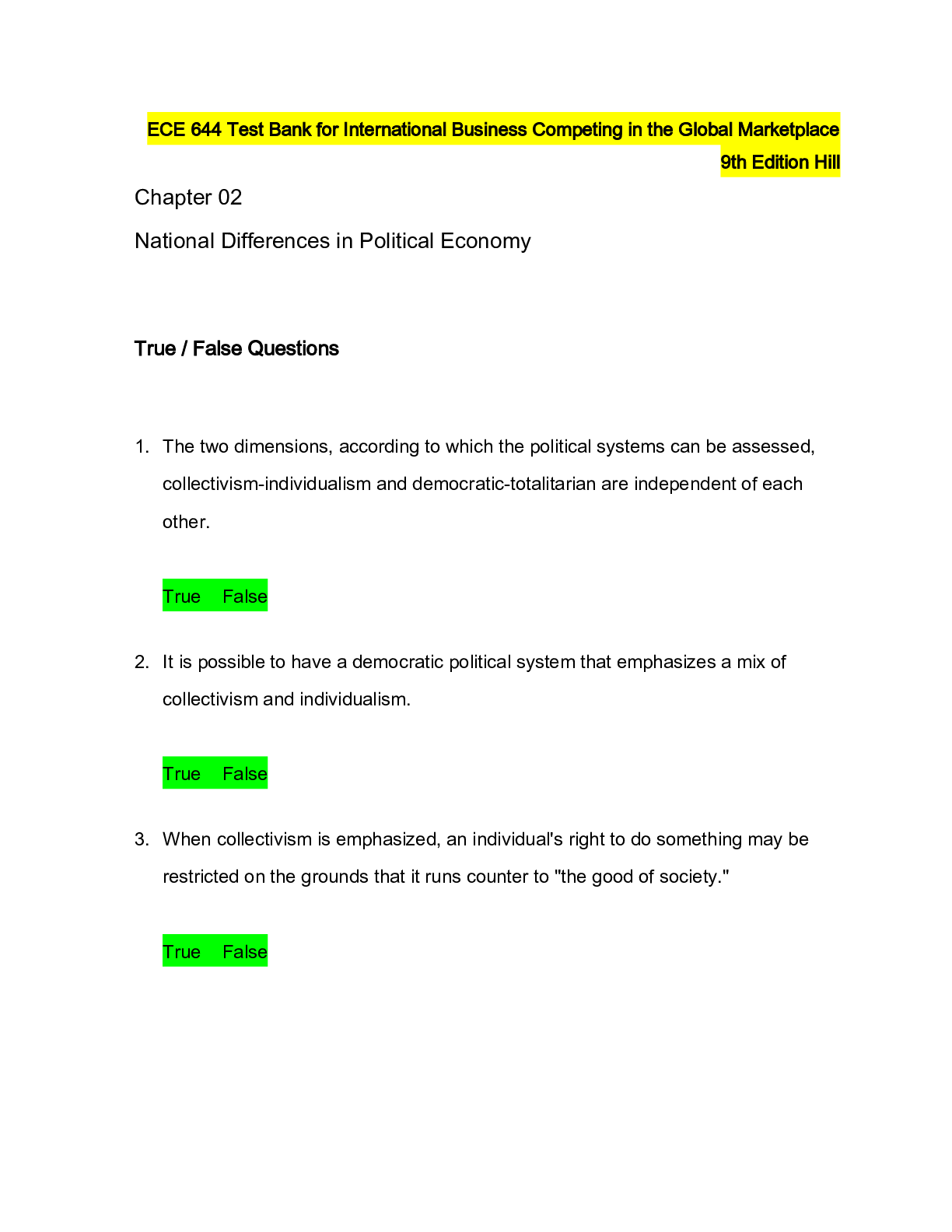
Buy this document to get the full access instantly
Instant Download Access after purchase
Add to cartInstant download
Reviews( 0 )
Document information
Connected school, study & course
About the document
Uploaded On
Mar 07, 2020
Number of pages
120
Written in
Additional information
This document has been written for:
Uploaded
Mar 07, 2020
Downloads
0
Views
81

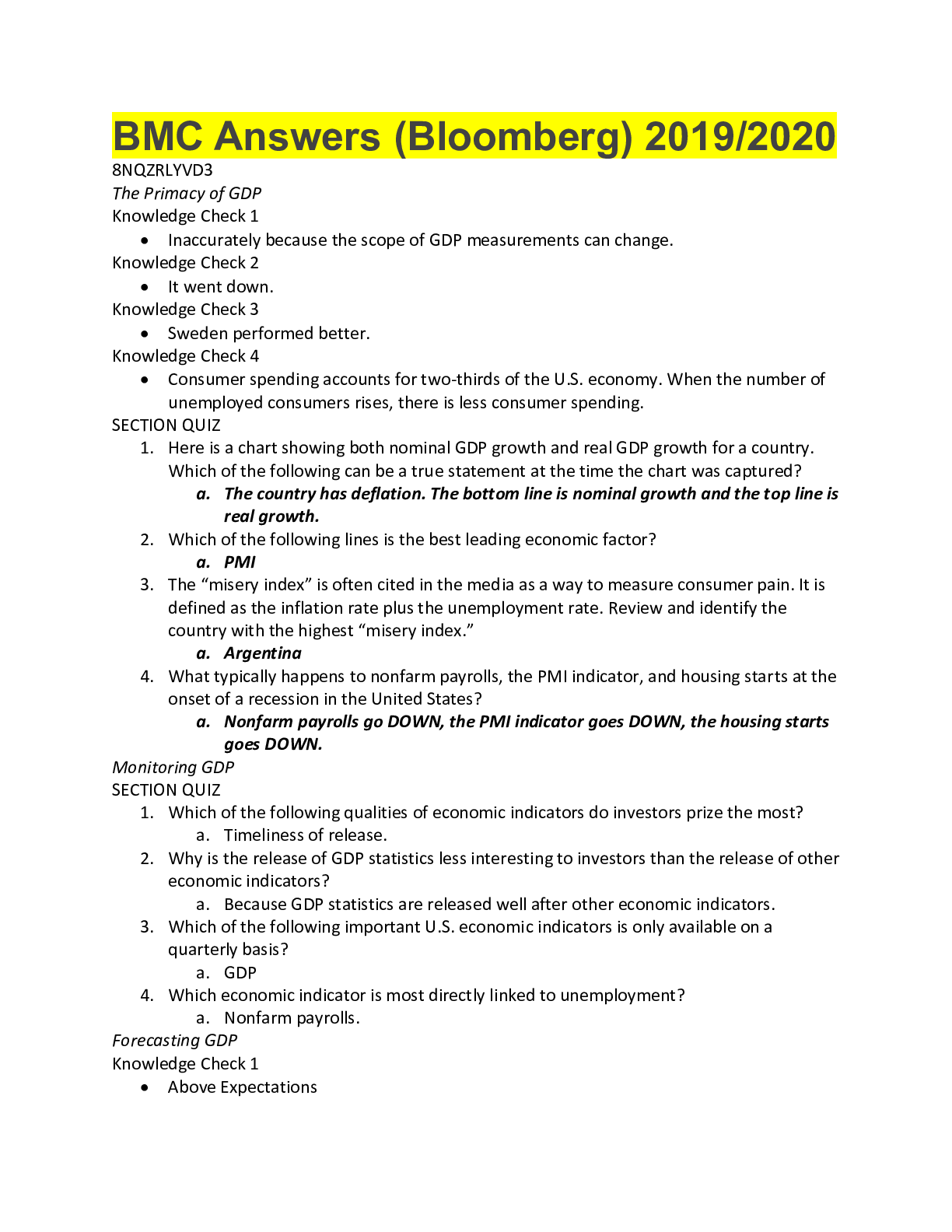
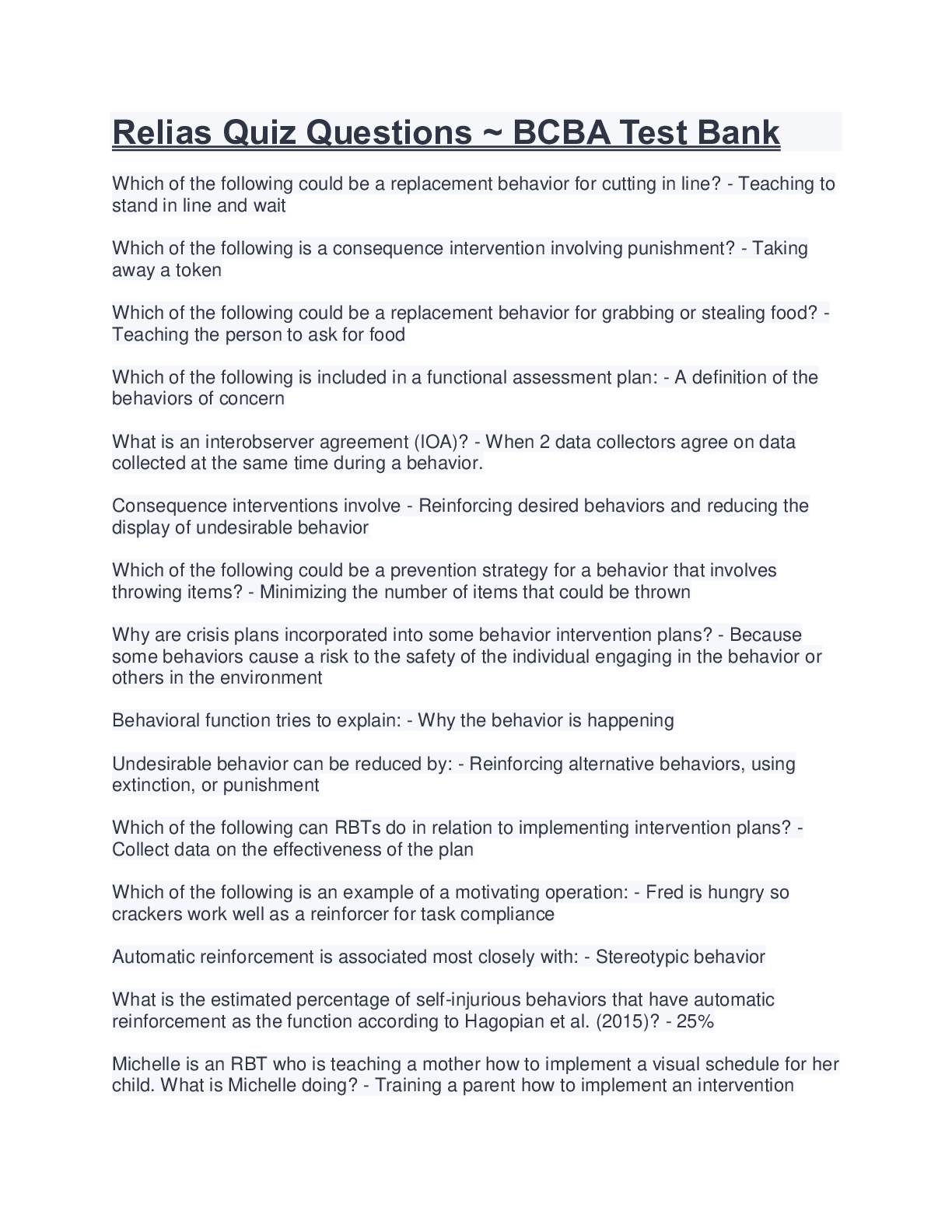
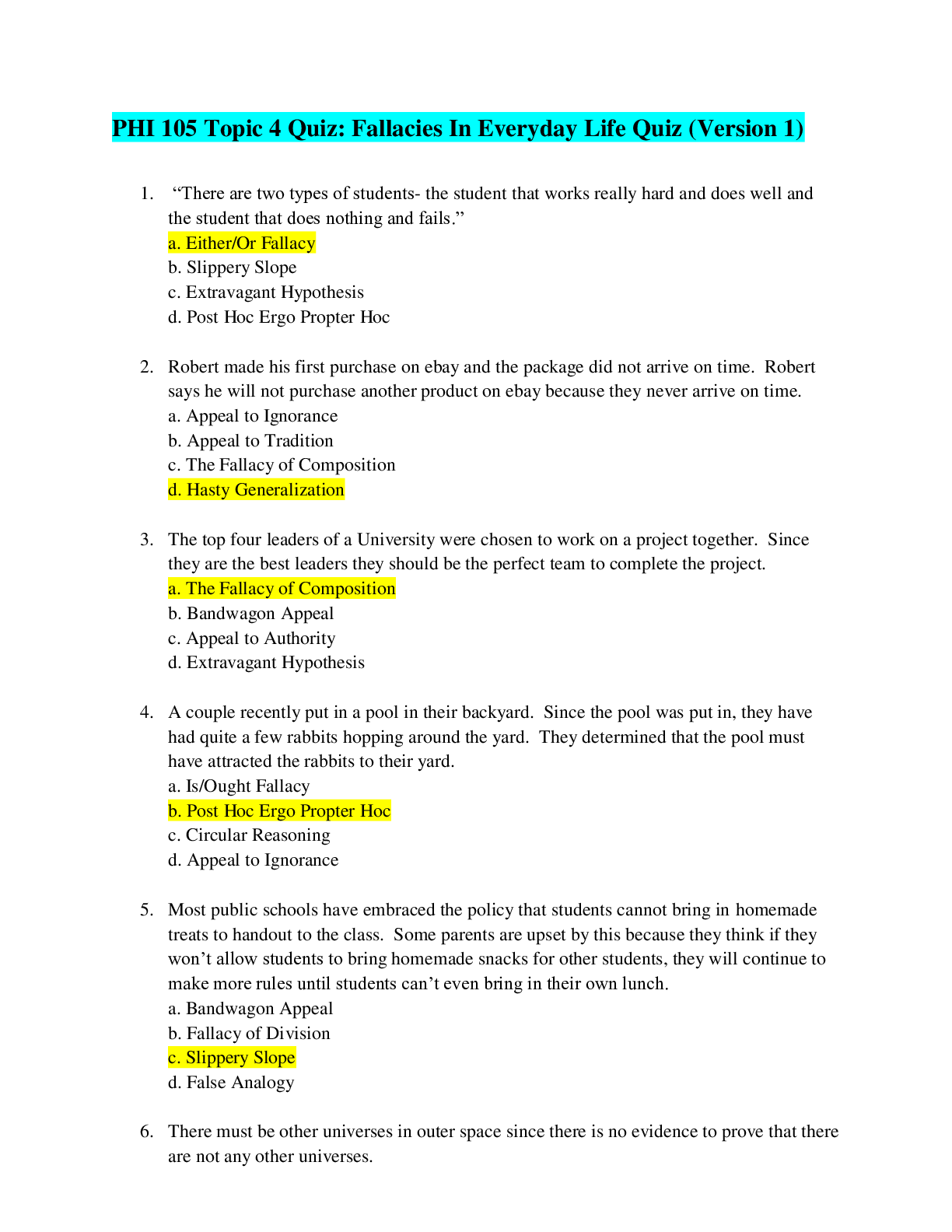

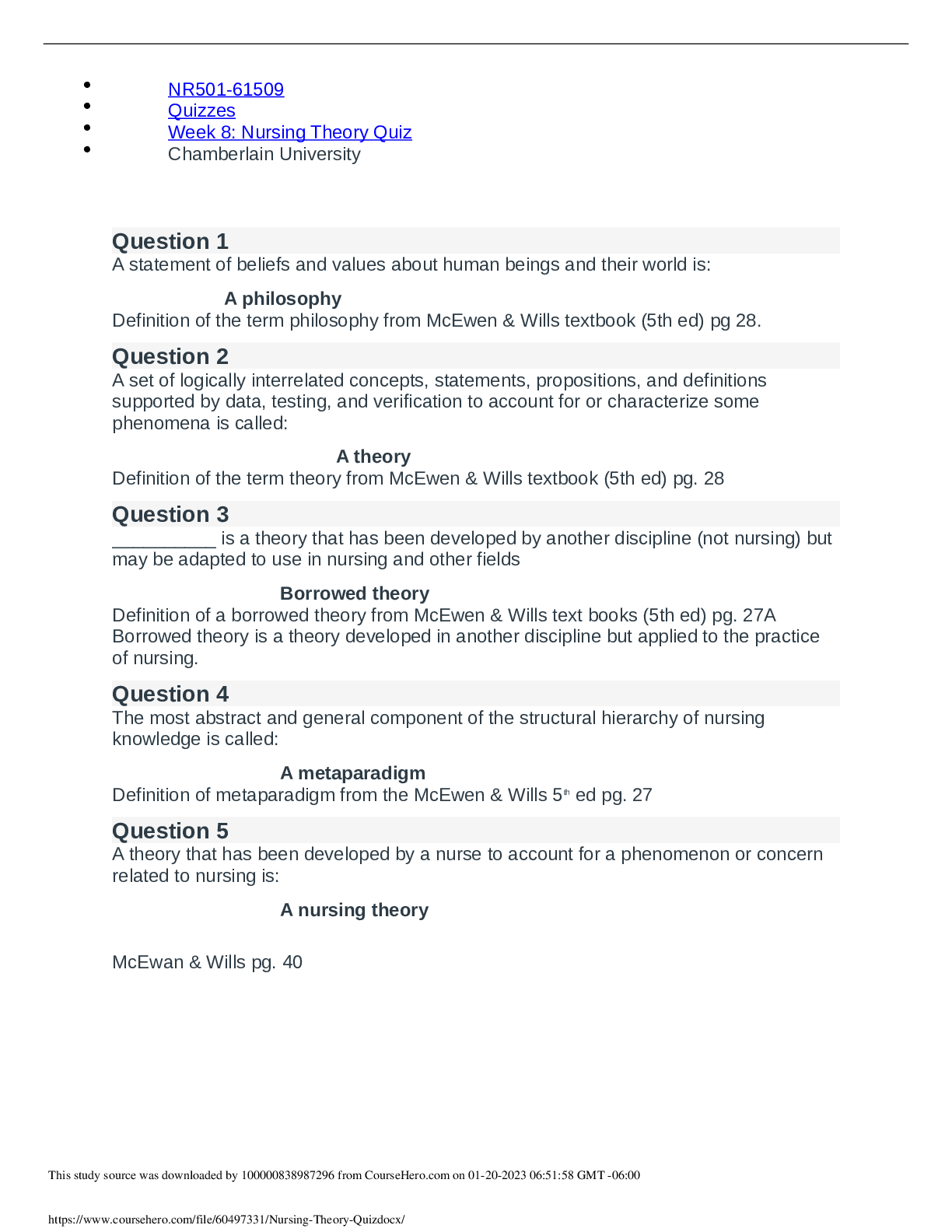
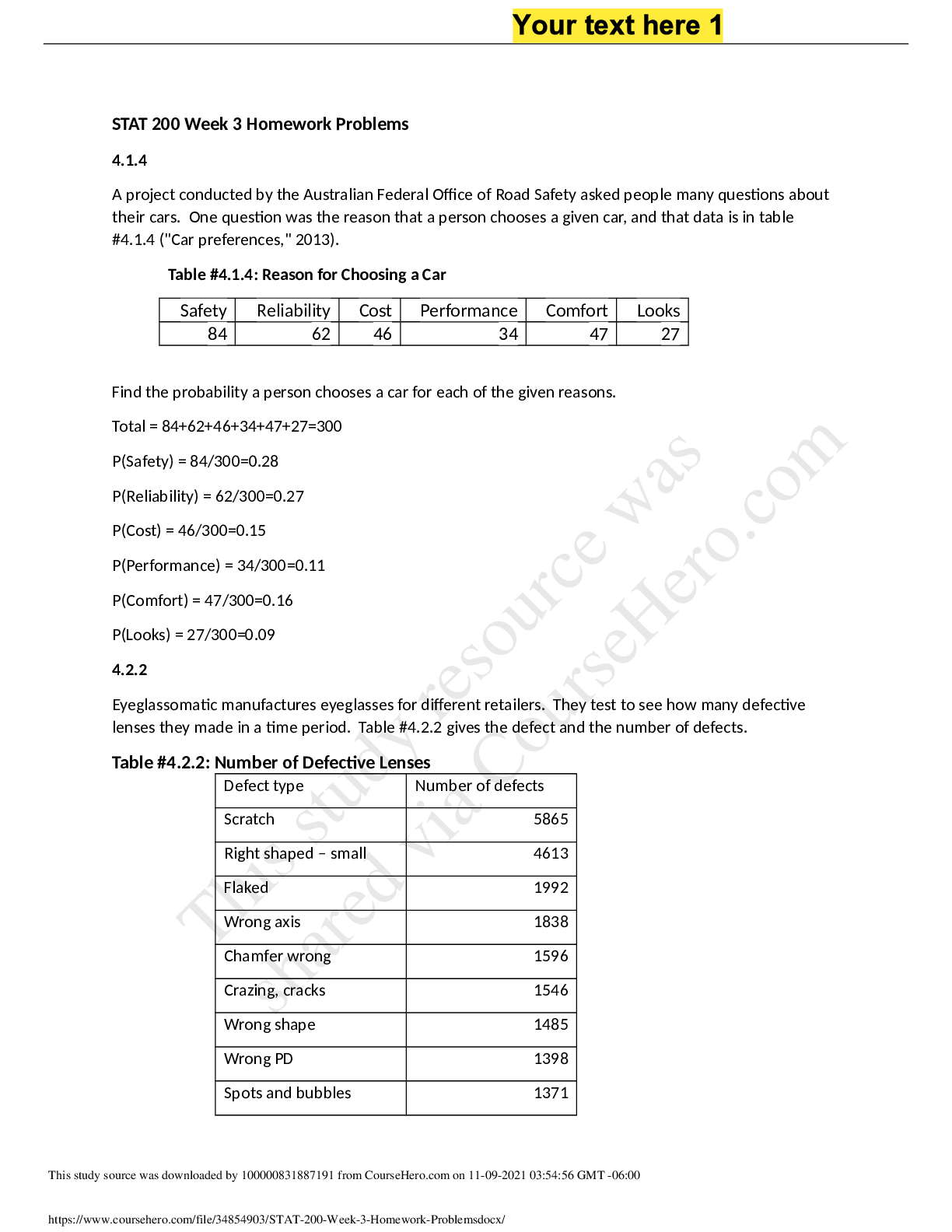
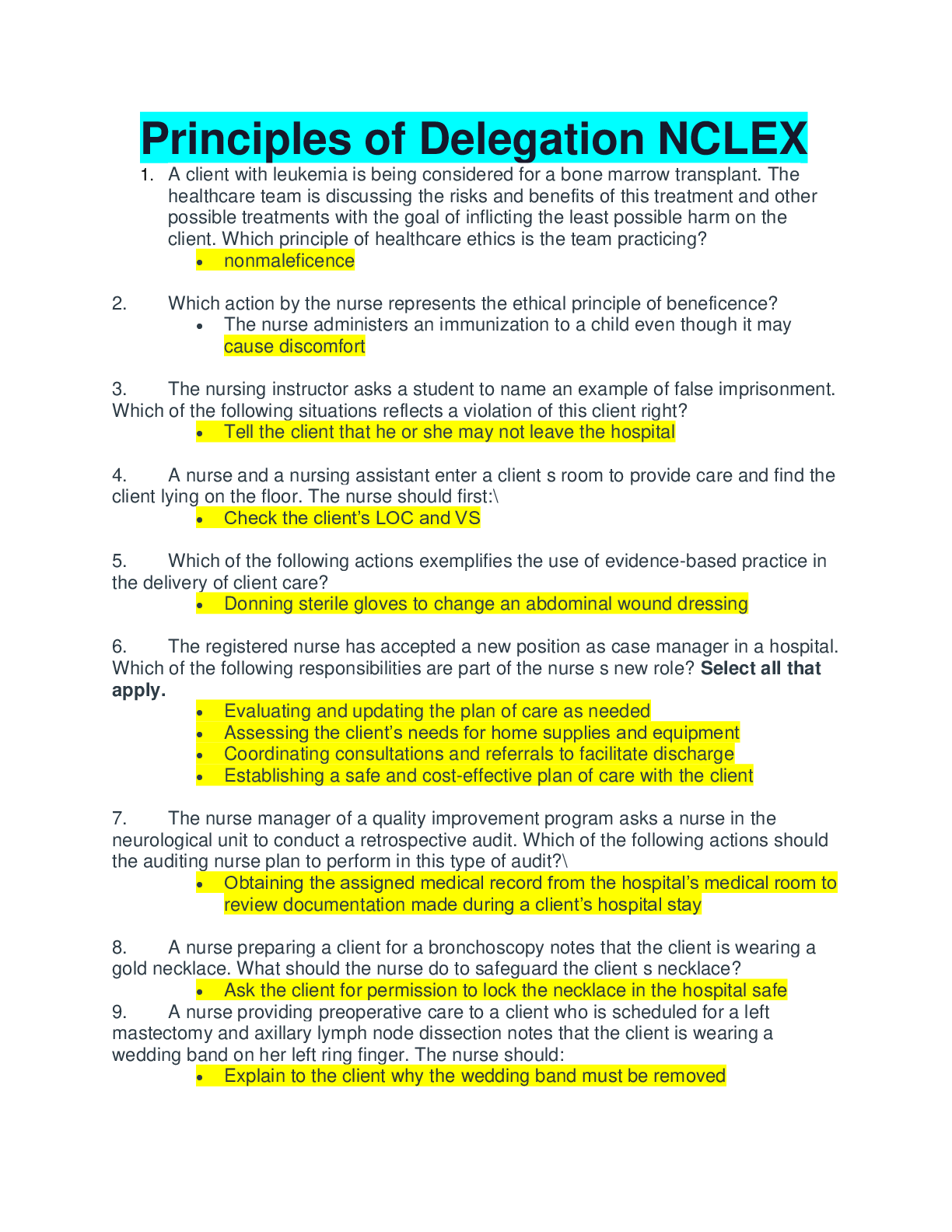
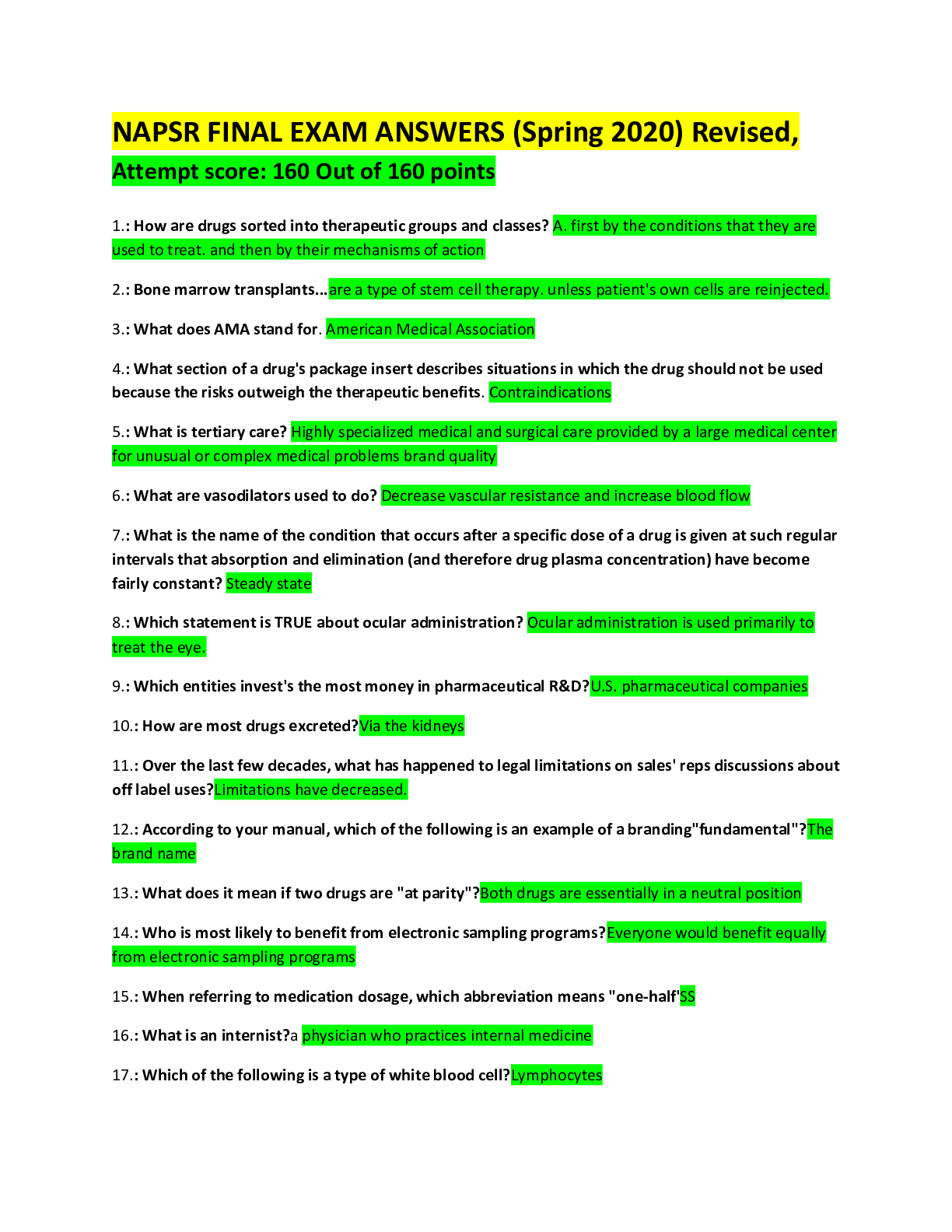
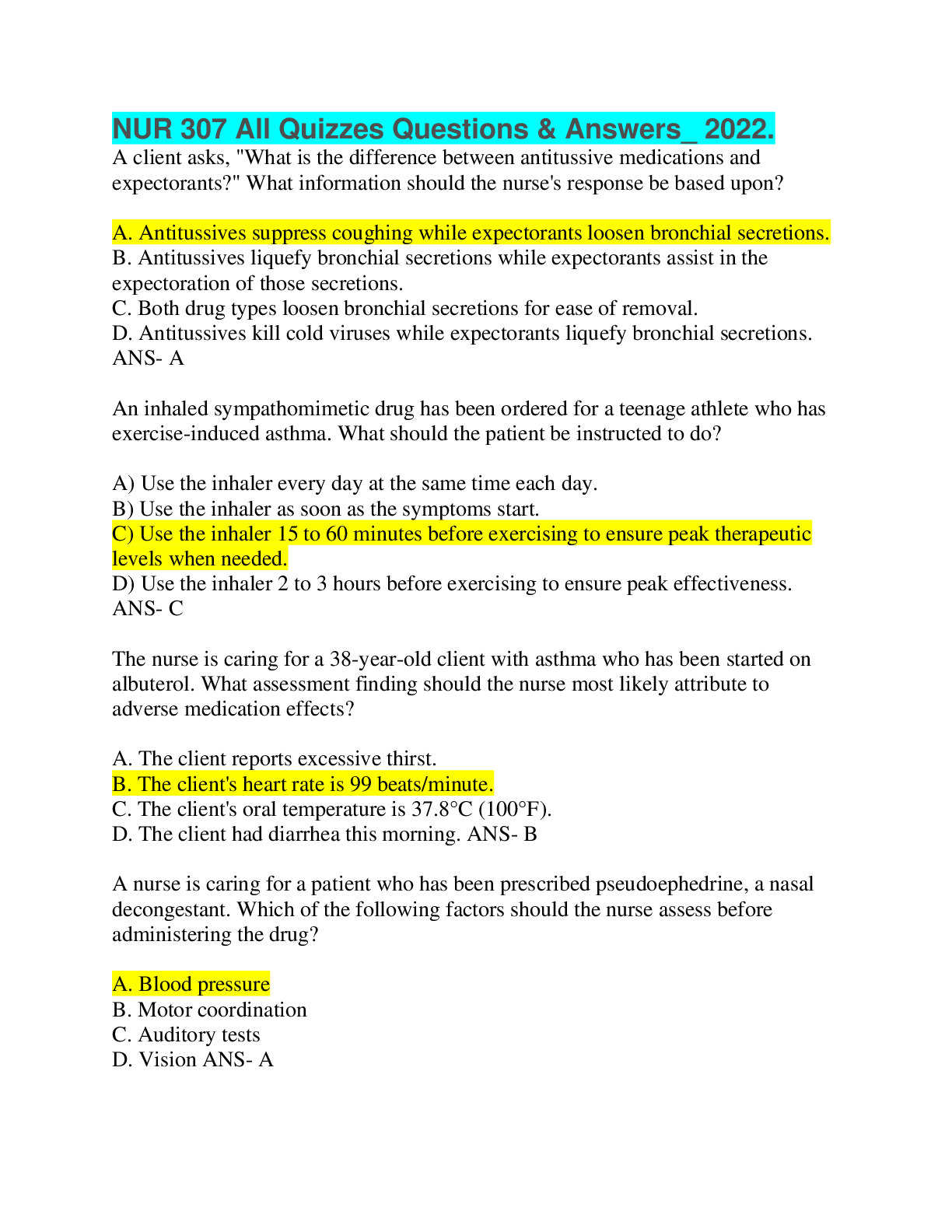
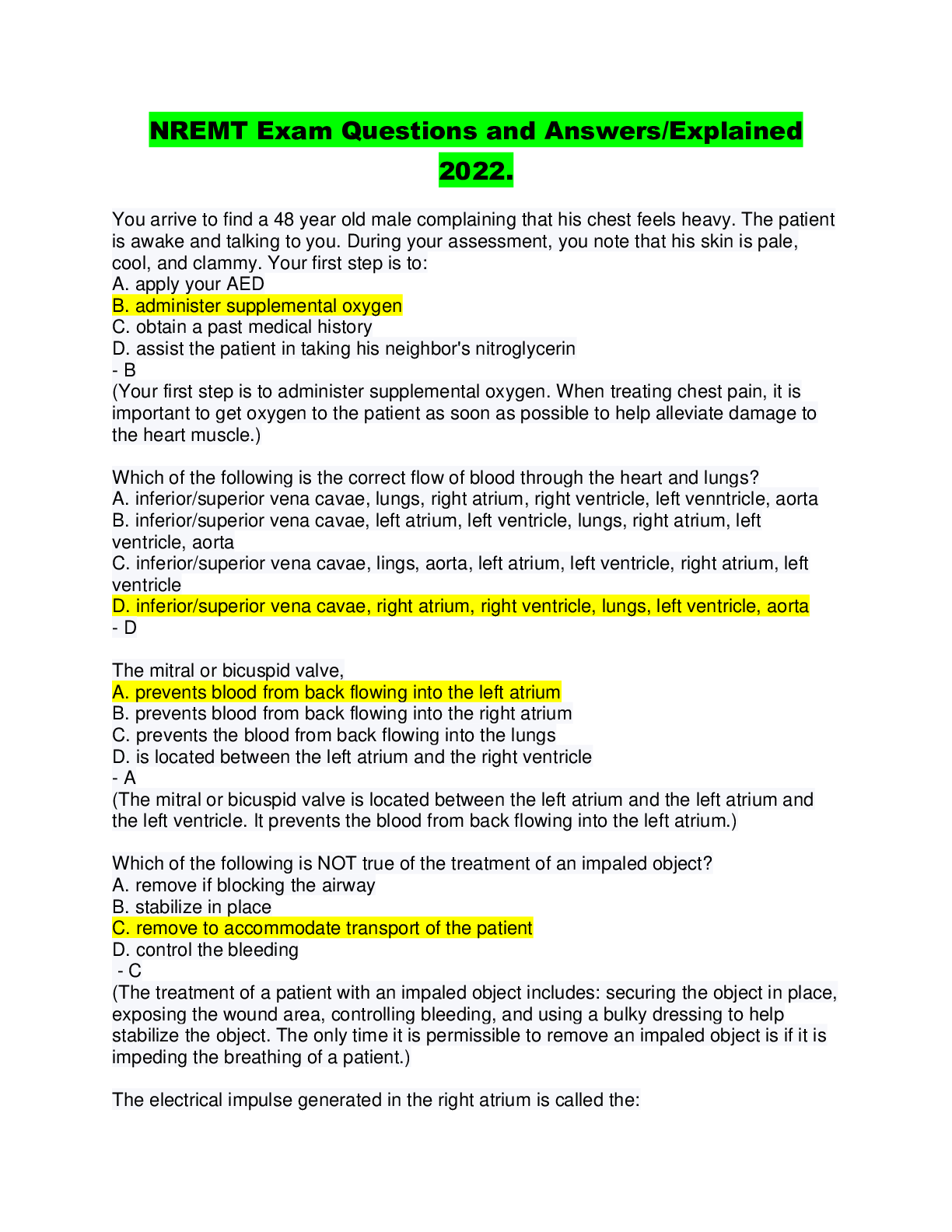
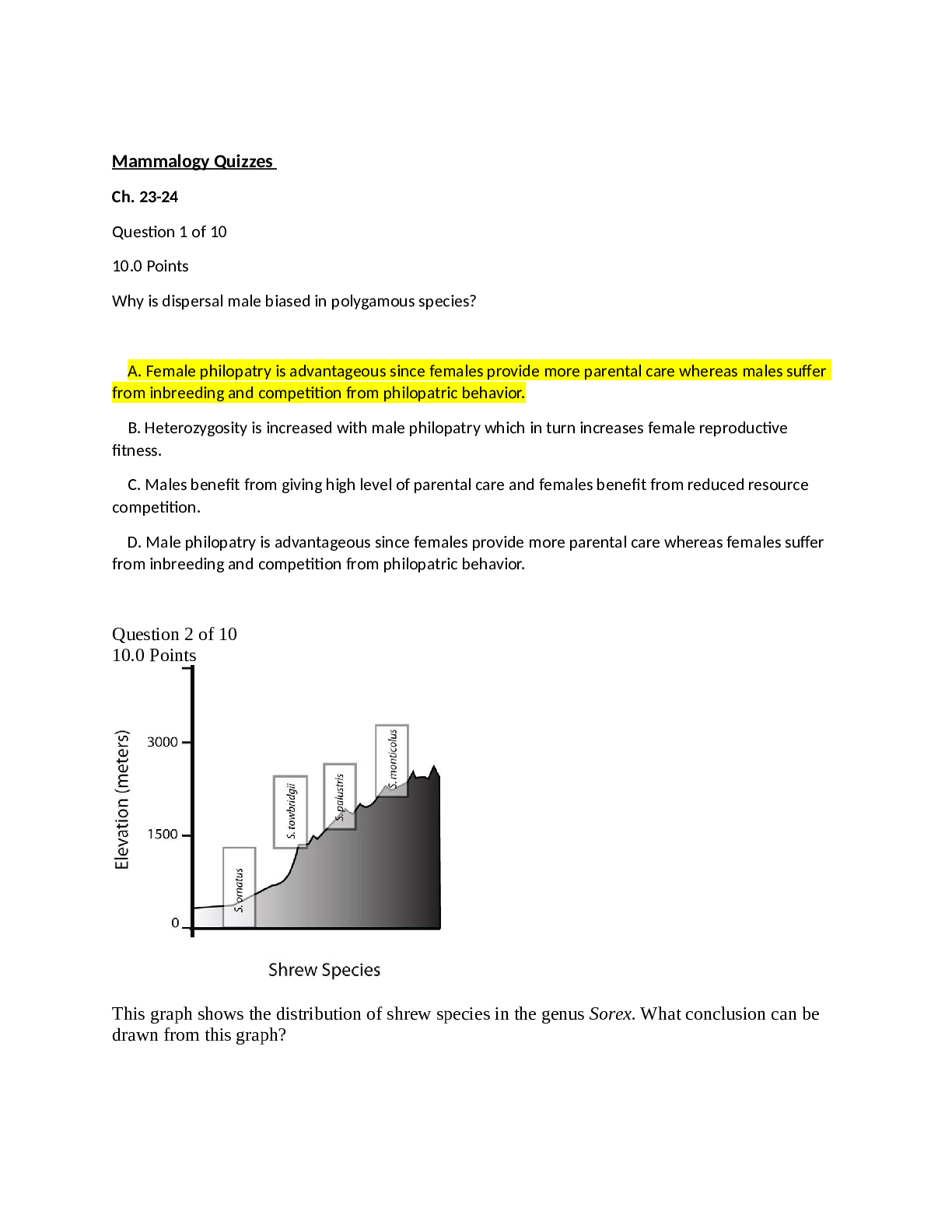
.png)
